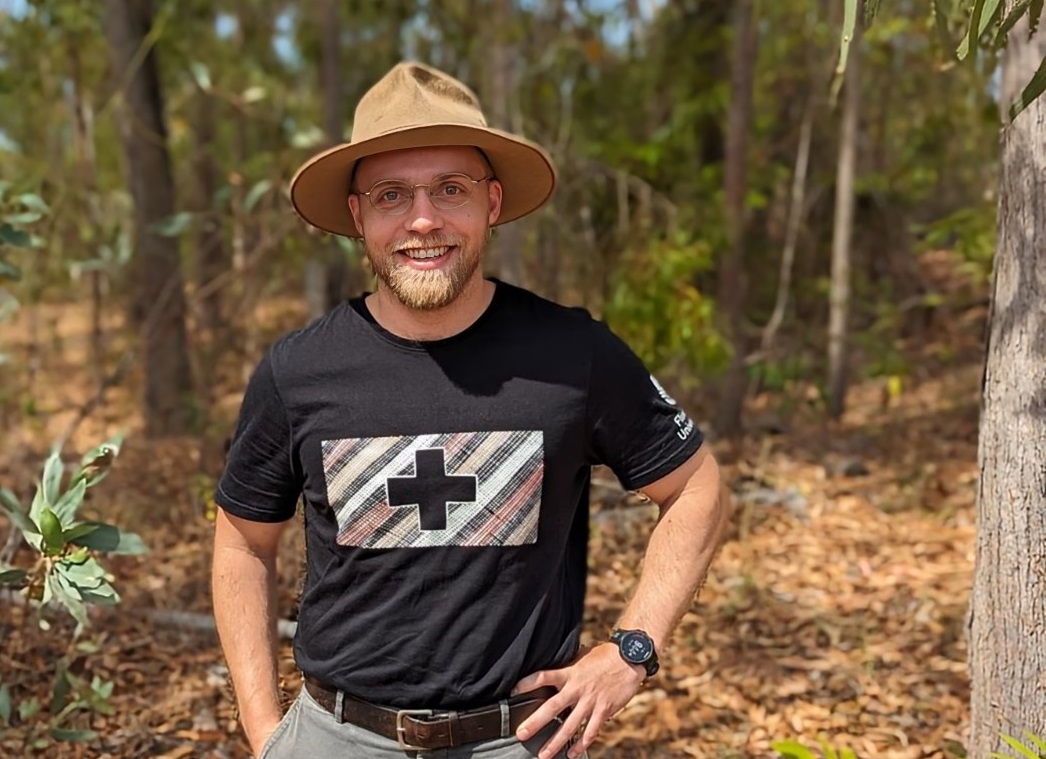
We caught up with double Staff Award winner Chris Hince to ask what he loves about working at Flinders’ Nhulunbuy campus – and he explained why his Yolŋu colleagues are a constant source of inspiration.
What is your role at Flinders?
Flinders University Nhulunbuy is primarily a clinical placement hub for allied health, medical, midwifery and nursing students. My official Flinders University title is Allied Health Research Project Officer; however, my role includes a blend of research, clinical supervision, teaching, community engagement and managing staff and campus activities. This eclectic mix keeps the job interesting and rewarding, albeit challenging.
My principal research project is focused on working with Yolŋu colleagues to develop, research and deliver a student-led and community-based cardiac rehab service to the communities of Nhulunbuy, Yirrkala and Gunyangara. This combines elements of student learning and service delivery in a culturally diverse, language diverse and remote environment. Time is often spent collaborating with local organisations and community members, supervising students in a variety of often interesting locations, and developing more effective engagement strategies.
Outside of my direct role, I have been working with our team to improve community engagement, especially with local schools, advocating for greater employment of local staff and working on integrating additional cultural and language learning into clinical teaching here, and we hope this will permeate more broadly into the wider health curriculum.
Tell us about your journey to Flinders.
After completing a Doctor of Physiotherapy in 2016, I wanted to explore physiotherapy beyond the hospital, and placement in the NT had piqued my interest in exploring elements of health equity, as well as remote service delivery. I found employment in Darwin, where I spent close to five years flying in and out of communities to deliver physiotherapy and health promotion services. I was privileged to visit communities across the Top End, and south to Pitjantjatjara and Arrernte country in Central Australia. The experience offered valuable insight into the diversity, strengths and beauty of Aboriginal Cultures, the challenges of remote service delivery and the ongoing struggles of inflexible and often culturally insensitive health systems and services.
I jumped at the opportunity to join the Flinders University team working with Yolŋu colleagues researching, developing and delivering a student-led allied health service. I saw this as a fantastic chance to combine my experience as a remote physiotherapist and my passion for improving remote health service delivery. I have now been working with Flinders for more than two years, primarily based in Nhulunbuy.
What’s your favourite part about your job?
It’s the relationships I have forged over the past two years. I’m surrounded by family in Nhulunbuy. I continue to learn from my colleagues and clients, and I’m incredibly grateful for their generosity. It’s such a rich and powerful environment to learn in. Yolŋu willingness to share knowledge, language and a laugh is humbling, motivating and extremely fulfilling.
What does a typical day look like for you?
A typical day rarely exists in Arnhem Land, which is part of the beauty and part of the challenge. For me, the best days are spent taking students and clients out on Country, fishing for that bathala guya (big fish in Yolŋu Matha), collecting bush foods, digging up various roots used for dying, pandanus fibre for weaving, gathering bush medicines to supplement medication, or exploring glorious beaches for shells to make jewellery. It’s an amazing process, where clients enjoy sharing a wealth of knowledge with students, while students adapt their clinical skills to apply their profession in a totally unique context. In these moments, the students develop a greater awareness of their own culture, education and its influences, while also appreciating that the confines of the clinic aren’t always the best places to inspire healthy habits or to have therapeutic interactions.
Who inspires you?
Our Yolŋu colleagues – Dhayirra Murphy Yunupingu, Mayalil Fay Marika and Lipaki Jenny Dhamarrandji and Rochelle Briston – are an ongoing source of inspiration. Their dedication to family, commitment to their roles in leading community and their devotion and duty to preserving culture is incredibly powerful. These individuals continue to offer their wisdom and advocate for greater collaboration between western and Yolŋu knowledges and systems.
I also find inspiration in the wider Flinders network, and I’m grateful for my growing connection with Professor Simone Ulalka Tur and her team in the Office of Indigenous Strategy and Engagement. Their achievements and tireless work in the face of ongoing adversity continues to offer motivation, along with their support and encouragement.
How do you spend your spare time?
I like to keep busy and active. There are plenty of community sports and activities to be involved with, because Nhulunbuy is an exceptionally social place. I have dabbled in netball and volleyball, often I go running around the back-tracks and keep an eye out for any hostile wildlife (mainly buffalo), and I have enjoyed trying to keep up with the fellas playing footy for the local Djarrak football club during the dry season. The other aspect of living in Arnhem Land is having the privilege to explore such an amazing, beautiful place. It’s made even more special in the company of Yolŋu colleagues and family, who have taught me how to catch fish on a handline and spear, where to find some of the best oysters and yams, and how to handle a mud crab without losing a finger or two.

